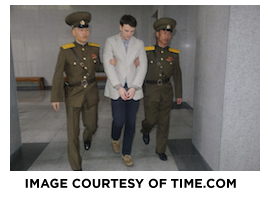Dear Reader,
Current tensions between the United States and North Korea are at an all-time high. North Korea continues to run missile tests and the U.S. vows to defend its allies.
Most recently, Kim Jong Un announced his country would begin mass-producing nuclear weapons in the coming year. He has also expressed an interest in reopening talks with South Korea, potentially jeopardizing its seven-decade alliance with the U.S.
Travel Warning
For obvious reasons, the U.S. government advises Americans not to travel to North Korea. However, there are many tourism companies in China that will take tourists into North Korea, all of which claim that their company offers the best experience and is 100% safe.
As with every aspect of life in the authoritarian nation, the government tightly controls tourism into North Korea. But it is estimated that approximately 230,000 Chinese citizens and about 5,000 Western tourists visit North Korea each year.
According to these Chinese tourism companies, about 20% of Western tourists are from the United States, although I’m not sure how much faith I put in that estimate. I can’t imagine why any American would want to visit North Korea — we wouldn’t exactly receive a warm welcome.
Consider the case of Otto Warmbier. Otto was a young college student who traveled into North Korea from China in January 2016. He was arrested by North Korean authorities and charged for the attempted theft of a propaganda poster from his hotel. In March 2016, he was convicted and sentenced to 15 years in prison with hard labor.

Sadly, about a month after he was sentenced, he suffered some sort of brain injury and eventually fell into a coma. In June 2017, North Korea finally agreed to release Otto.
He was medically evacuated back to his hometown of Cincinnati, where U.S. doctors evaluated him. Six days after his arrival in the U.S., Otto passed away as a result of the injuries he suffered while in North Korea.
This is an extreme example of North Korean tourism gone awry, but here’s the thing: Not only does North Korea control which companies are allowed to bring people into the country, but they also dictate the rules and regulations these tourist companies must follow.
It’s also not uncommon for North Korea to send one of their own people undercover to keep an eye on these tourist groups. They won’t stand out. They will speak English and act like they are a part of the tour even though their real purpose is to monitor the tourists and watch every move they make.
In other words, if you go to North Korea, you are essentially inviting them to spy on you.
Spies in Your Own Home
Even if you never plan on visiting North Korea, you may be inviting people to spy on you right here in the U.S. Not by an overbearing government but by large corporations such as Google and Amazon.
If you use a smart-home device like Amazon Echo or Google Home, you are essentially welcoming a spy into your home with open arms — and giving them permission to record and report everything about you.
That being said, since I know so many Americans rely on the convenience of these devices, here are three steps you should take to protect your privacy:
1. Turn off the mic. Wait a second, you’re probably thinking, won’t that make the device useless? Well, yes. When I say turn off the mic, I mean that you should only do this when you are having a private meeting or guests over. For example, if a co-worker is coming over to discuss business, you need to ensure nothing confidential is picked up by the mic. Basically, think about the times when you are having extra-sensitive conversations that you don’t want to leave your home — that’s when you should turn off the mic.
2) Turn off voice purchases. Who would have ever imagined the day when you can simply say, “Alexa, buy more cereal,” and it would be done. Even though this function is incredibly convenient, it’s also extremely risky because it makes it far too simple to make an accidental purchase. Consider this: If you are watching TV and a commercial says you should buy a diamond ring, who knows what could end up being delivered or what charges might end up on your credit card.
3) Cover the camera. I always keep a tiny piece of tape over the camera on the top of my laptop. Frankly, you should do the same thing to the camera on your smart-home device. I understand that many people use these devices as security cameras or baby monitors, but do you know how much these cameras pick up when you aren’t using them? Are they simply always on? This is definitely a risk I don’t want to take, so I recommend covering the lens.
I realize these smart-home devices can be very useful and have the ability to make our lives simpler. However, they are still fairly new and I believe the companies who make these devices still have numerous security concerns to figure out.
At this point, I wouldn’t want one of these devices in my home and I have no plans to get one. But if you already have one or plan to purchase one for your home, follow these three simple steps to discourage people from spying on you.
Stay safe,

Jason Hanson






